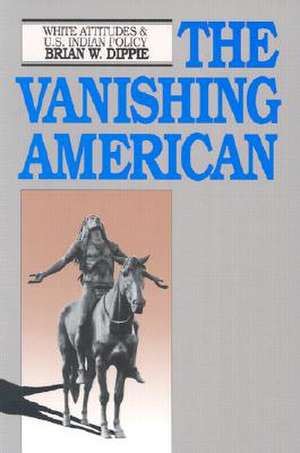The Vanishing American: White Attitudes and U.S. Indian Policy
Autor Brian W. Dippieen Limba Engleză Paperback – 30 sep 1991
That belief not only persisted, writes historian Brian Dippie, but it also spread throughout American culture. Soon the "vanishing Indian" appeared in science, literature, art, popular culture, and, most importantly, federal policy.
"The assumption that the Indians are a vanishing race has about it the quality of self-fulfilling prophecy," Dippie writes. In this classic study, first published in 1982, he traces the origins of this assumption and documents its insidious effects on U.S. policy toward Indians from the beginning of the nation's history through the Indian New Deal of the 1930s. He describes its role in early attempts at civilization and education, segregation of Indians west of the Mississippi, post-Civil War reform, the Dawes Act and allotment, the gradualism of early twentieth-century policy, the reform movement of the 1920s, John Collier's Indian Reorganization Act, and into the 1970s.
Preț: 248.02 lei
Nou
Puncte Express: 372
Preț estimativ în valută:
47.47€ • 49.42$ • 40.11£
47.47€ • 49.42$ • 40.11£
Carte disponibilă
Livrare economică 17 februarie-03 martie
Preluare comenzi: 021 569.72.76
Specificații
ISBN-13: 9780700605071
ISBN-10: 070060507X
Pagini: 446
Dimensiuni: 155 x 229 x 23 mm
Greutate: 0.63 kg
Ediția:Revised
Editura: University Press of Kansas
ISBN-10: 070060507X
Pagini: 446
Dimensiuni: 155 x 229 x 23 mm
Greutate: 0.63 kg
Ediția:Revised
Editura: University Press of Kansas
Textul de pe ultima copertă
'The unifying theme is the notion that the Native American is doomed, by radical constitution, by historical necessity, by the realities of Indian-white relations, to disappear from the face of the earth. Dipple is surely right in seeing the importance of this idea from the late eighteenth century on. He makes a convincing case that it was crucial in every intellectual and policy development in the succeeding decades. -New Mexico Historical review














